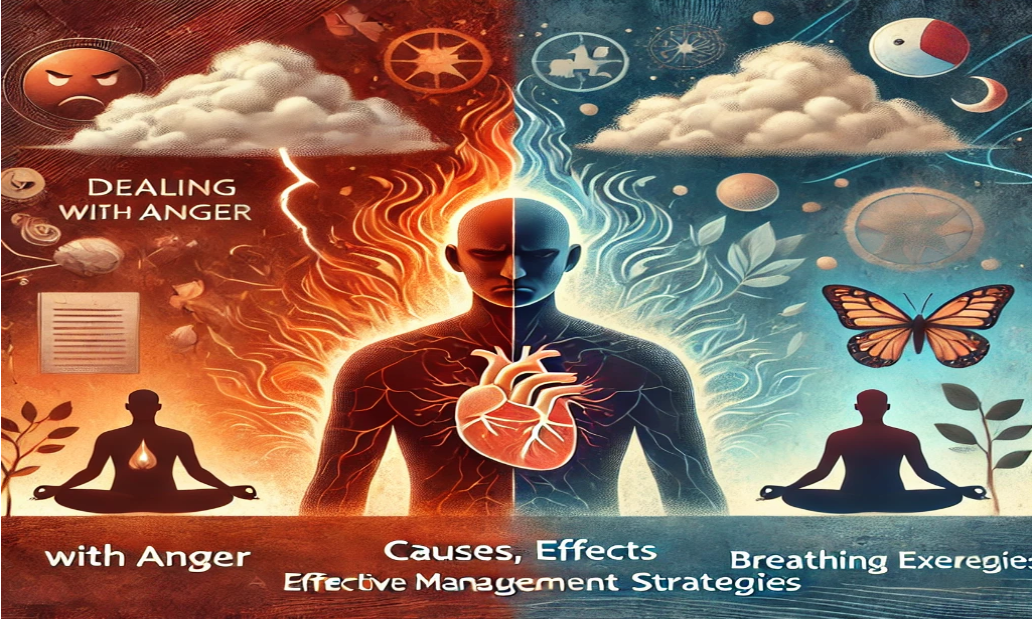
Dealing with Anger: A Complete Guide to Understanding and Managing Anger Effectively
Introduction
Anger is a natural human emotion, but when left unchecked, it can lead to destructive consequences. Understanding anger, its causes, and how to manage it effectively is essential for personal and professional well-being. This comprehensive guide will explore the psychology of anger, its impact, strategies for controlling it, courses to help with anger management, and real-life problem-solving examples.
Table of Contents
What is Anger?
The Psychology and Science Behind Anger
Common Causes of Anger
Types of Anger
Signs and Symptoms of Uncontrolled Anger
The Negative Effects of Anger
Benefits of Controlling Anger
Effective Strategies for Managing Anger
Courses and Therapy for Anger Management
Disadvantages of Poor Anger Control
Difference Between Healthy and Unhealthy Anger
Problem-Solving Examples in Anger Management
Conclusion and Key Takeaways
What is Anger?
Anger is an emotional response to perceived threats, frustration, or injustice. While it is a normal reaction, excessive or uncontrolled anger can lead to personal, social, and professional problems.
The Psychology and Science Behind Anger
How Anger Works in the Brain
The amygdala, a part of the brain responsible for emotions, triggers the anger response.
The prefrontal cortex regulates anger and decision-making.
Hormones like adrenaline and cortisol increase heart rate and blood pressure, preparing the body for action.
Common Causes of Anger
Stress and frustration
Unmet expectations
Relationship issues
Workplace conflicts
Financial problems
Childhood trauma
Physical or emotional abuse
Types of Anger
Passive Anger: Indirect expression of anger through sarcasm, withdrawal, or resentment.
Aggressive Anger: Direct and often destructive expression of anger, including verbal or physical aggression.
Assertive Anger: Healthy and controlled expression of anger through communication and problem-solving.
Signs and Symptoms of Uncontrolled Anger
Increased heart rate and blood pressure
Clenched fists, tight muscles
Verbal or physical aggression
Feeling of loss of control
Frequent irritability
Difficulty concentrating
The Negative Effects of Anger
Health Issues: High blood pressure, heart disease, headaches
Mental Health Problems: Anxiety, depression, stress
Relationship Struggles: Broken friendships, marital conflicts
Workplace Issues: Job loss, conflicts with colleagues
Legal Problems: Violence, assault charges, lawsuits
Benefits of Controlling Anger
Improved relationships
Better emotional intelligence
Reduced stress and anxiety
Enhanced problem-solving skills
Increased self-control and confidence
Effective Strategies for Managing Anger
Deep Breathing Techniques – Inhale deeply through your nose, hold for a few seconds, and exhale slowly.
Mindfulness and Meditation – Stay present in the moment to reduce emotional reactions.
Exercise – Physical activity releases pent-up energy and reduces stress.
Cognitive Behavioral Therapy (CBT) – Identifies and changes negative thought patterns.
Communication Skills – Express emotions assertively rather than aggressively.
Time-Out Method – Step away from a stressful situation to cool down.
Journaling – Writing down emotions helps with self-reflection.
Seeking Professional Help – Counseling and therapy can be beneficial.
Courses and Therapy for Anger Management
Online Courses
Udemy: Anger Management Techniques for a Healthy Life
Coursera: Emotional Intelligence and Anger Control
Skillshare: Managing Stress and Anger in the Workplace
Therapy Options
Cognitive Behavioral Therapy (CBT)
Anger Management Counseling
Group Therapy Sessions
Mindfulness-Based Therapy
Disadvantages of Poor Anger Control
Broken relationships and social isolation
Poor professional reputation
Increased health risks
Legal consequences
Decreased overall happiness
Difference Between Healthy and Unhealthy Anger
| Healthy Anger | Unhealthy Anger |
|---|---|
| Expressed assertively | Expressed aggressively or suppressively |
| Leads to positive conflict resolution | Leads to violence or emotional outbursts |
| Improves relationships | Damages relationships |
| Encourages self-awareness | Leads to guilt and regret |
Problem-Solving Examples in Anger Management
Workplace Conflict Resolution
A manager and employee had a heated argument. Instead of reacting aggressively, the manager scheduled a one-on-one discussion, listened actively, and proposed a solution, leading to a stronger working relationship.
Relationship Dispute Resolution
A couple experiencing frequent arguments decided to attend anger management therapy, learning how to communicate their frustrations constructively rather than through shouting or silent treatment.
Dealing with Road Rage
A driver feeling frustrated in traffic practiced deep breathing and reminded themselves that getting angry wouldn’t change the situation, reducing stress and road rage incidents.
Conclusion and Key Takeaways
Anger is a normal emotion, but learning how to manage it is essential for a healthy and successful life. By practicing mindfulness, improving communication, and seeking professional help when necessary, individuals can turn anger into a constructive force rather than a destructive one.
Frequently Asked Questions (FAQ)
Q1. What are the main causes of anger?
Anger can be triggered by stress, frustration, unmet expectations, relationship issues, workplace conflicts, and past trauma.
Q2. How does anger affect health?
Uncontrolled anger can lead to high blood pressure, heart disease, anxiety, depression, and other health problems.
Q3. What are the best anger management techniques?
Some effective techniques include deep breathing, mindfulness, exercise, cognitive behavioral therapy (CBT), and improving communication skills.
Q4. Are there online courses for anger management?
Yes, platforms like Udemy, Coursera, and Skillshare offer anger management courses tailored to different needs.
Q5. What is the difference between healthy and unhealthy anger?
Healthy anger is expressed assertively and leads to problem-solving, while unhealthy anger is either suppressed or expressed aggressively, causing harm.
Q6. Can therapy help in controlling anger?
Yes, professional therapy, including cognitive behavioral therapy (CBT) and anger management counseling, can significantly help individuals control their anger.
Q7. How can I control my anger immediately?
Try deep breathing, counting to ten, stepping away from the situation, and using relaxation techniques like meditation.
Call to Action
Have you struggled with anger? Share your thoughts and tips in the comments below!








